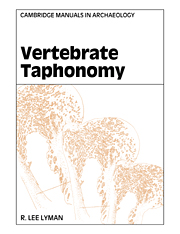Book contents
- Frontmatter
- Dedication
- Contents
- List of figures
- List of tables
- Preface
- Acknowledgements
- 1 WHAT IS TAPHONOMY?
- 2 THE HISTORY AND STRUCTURE OF TAPHONOMY
- 3 TAPHONOMY IN PRACTICE AND THEORY
- 4 STRUCTURE AND QUANTIFICATION OF VERTEBRATE SKELETONS
- 5 VERTEBRATE MORTALITY, SKELETONIZATION, DISARTICULATION, AND SCATTERING
- 6 ACCUMULATION AND DISPERSAL OF VERTEBRATE REMAINS
- 7 FREQUENCIES OF SKELETAL PARTS
- 8 BUTCHERING, BONE FRACTURING, AND BONE TOOLS
- 9 OTHER BIOSTRATINOMIC FACTORS
- 10 BURIAL AS A TAPHONOMIC PROCESS
- 11 DIAGENESIS
- 12 TAPHONOMY OF FISH, BIRDS, REPTILES, AND AMPHIBIANS
- 13 DISCUSSION AND CONCLUSIONS
- Bibliography
- Glossary of taphonomy terminology
- Index
1 - WHAT IS TAPHONOMY?
Published online by Cambridge University Press: 05 August 2014
- Frontmatter
- Dedication
- Contents
- List of figures
- List of tables
- Preface
- Acknowledgements
- 1 WHAT IS TAPHONOMY?
- 2 THE HISTORY AND STRUCTURE OF TAPHONOMY
- 3 TAPHONOMY IN PRACTICE AND THEORY
- 4 STRUCTURE AND QUANTIFICATION OF VERTEBRATE SKELETONS
- 5 VERTEBRATE MORTALITY, SKELETONIZATION, DISARTICULATION, AND SCATTERING
- 6 ACCUMULATION AND DISPERSAL OF VERTEBRATE REMAINS
- 7 FREQUENCIES OF SKELETAL PARTS
- 8 BUTCHERING, BONE FRACTURING, AND BONE TOOLS
- 9 OTHER BIOSTRATINOMIC FACTORS
- 10 BURIAL AS A TAPHONOMIC PROCESS
- 11 DIAGENESIS
- 12 TAPHONOMY OF FISH, BIRDS, REPTILES, AND AMPHIBIANS
- 13 DISCUSSION AND CONCLUSIONS
- Bibliography
- Glossary of taphonomy terminology
- Index
Summary
Only a small part of what once existed was buried in the ground; only a part of what was buried has escaped the destroying hand of time; of this part all has not yet come to light again; and we all know only too well how little of what has come to light has been of service for our science.
(O. Montelius 1888:5)Introduction
Taphonomy is the science of the laws of embedding or burial. More completely, it is the study of the transition, in all details, of organics from the biosphere into the lithosphere or geological record. These definitions were given by the Russian paleontologist I. A. Efremov (1940) who coined the term from the Greek words taphos (burial) and nomos (laws). Taphonomy is, however, important not only to paleontologists, but to archaeologists, especially zooarchaeologists and paleoethnobotanists, who study the organic remains making up part of the archaeological record. That importance has come to be widely recognized in the past 20 or 30 years. Taphonomy is now seen as important because it is often taken to connote that the zooarchaeological and ethnobotanical records are biased if some non-human-related processes have affected the condition or frequencies of biological remains. While that perception is often correct, I will show that this perception is frequently incorrect.
The reason archaeologists should be concerned with taphonomy is that it involves the formation of what is often a major part of the archaeological record.
- Type
- Chapter
- Information
- Vertebrate Taphonomy , pp. 1 - 11Publisher: Cambridge University PressPrint publication year: 1994
- 2
- Cited by

